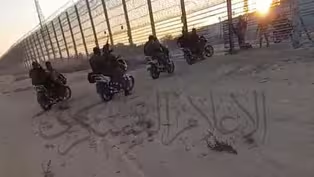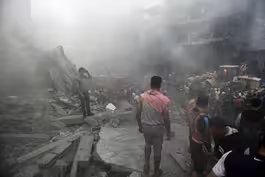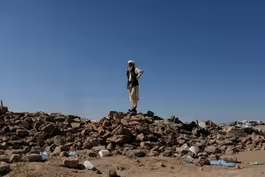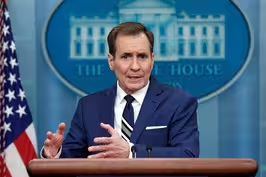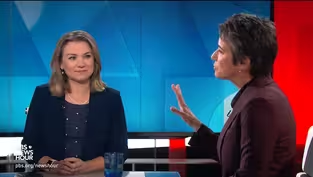
Native Hawaiians push to preserve heritage after wildfires
Clip: 10/9/2023 | 5m 34sVideo has Closed Captions
Native Hawaiians push to preserve history and heritage following Maui wildfires
On this Indigenous Peoples' Day, we're taking a closer look at the cultural heritage lost in the devastating Maui fires. Amna Nawaz spoke with Rosalyn Lapier, a professor of history at the University of Illinois Urbana-Champaign, about what Native Hawaiian communities want and need to rebuild.
Problems playing video? | Closed Captioning Feedback
Problems playing video? | Closed Captioning Feedback
Major corporate funding for the PBS News Hour is provided by BDO, BNSF, Consumer Cellular, American Cruise Lines, and Raymond James. Funding for the PBS NewsHour Weekend is provided by...

Native Hawaiians push to preserve heritage after wildfires
Clip: 10/9/2023 | 5m 34sVideo has Closed Captions
On this Indigenous Peoples' Day, we're taking a closer look at the cultural heritage lost in the devastating Maui fires. Amna Nawaz spoke with Rosalyn Lapier, a professor of history at the University of Illinois Urbana-Champaign, about what Native Hawaiian communities want and need to rebuild.
Problems playing video? | Closed Captioning Feedback
How to Watch PBS News Hour
PBS News Hour is available to stream on pbs.org and the free PBS App, available on iPhone, Apple TV, Android TV, Android smartphones, Amazon Fire TV, Amazon Fire Tablet, Roku, Samsung Smart TV, and Vizio.
Providing Support for PBS.org
Learn Moreabout PBS online sponsorshipAMNA NAWAZ: On this indigenous peoples day, a closer look now at the cultural heritage lost in the devastating Maui fires.
I spoke recently with Rosalyn LaPier, professor of history at the University of Illinois, Urbana-Champaign, about what Native Hawaiian communities want and need to rebuild.
Rosalyn LaPier, welcome to the "NewsHour."
And thank you for joining us.
ROSALYN LAPIER, University of Illinois, Urbana-Champaign: Thank you for having me.
AMNA NAWAZ: So there's been a lot of reporting on the Native Hawaiian history and the heritage and the community that was lost in those devastating wildfires.
All these weeks later, how are you thinking about all of that, about what was lost and also what rebuilding looks like moving forward?
ROSALYN LAPIER: Well, I think that there's still, in my mind, significant coverage of -- when people talk about the history of Lahaina and Maui, of focusing more on the settler colonial history.
For example, there's been a significant loss of historic buildings and churches.
And, again, that's more settler colonial history.
One of the things that has gotten some coverage, but not as much as it could, is the Native Hawaiian, the Native history of that region.
It is a place that the Native Hawaiians have viewed for a very long time as a sacred place, a sacred area.
It is a place where they have divine entities live there.
And it is also a place that's important to their history, because it is a place where their royal family chose to live and made their first capital as part of the Hawaiian kingdom.
AMNA NAWAZ: There is so much focus on the history, but also on the community that lives there today, the Native Hawaiian communities who call that area home.
When you talk to them and you hear their concerns, what are they chiefly concerned about right now in terms of how the process for moving forward has been unfolding?
ROSALYN LAPIER: So, one of the biggest concerns, of course, is the restoration process, right, the rebuilding process, and to what extent Native Hawaiian community is going to be part of that process, part of the discussion and the decision-making, and to what extent there is going to be an effort to put them first and to put their -- what they think is important first, for example, restoring, again, their sacred sites, restoring their historic places, before there's an effort to sort of restore the settler colonial history of that particular area.
AMNA NAWAZ: There's also been some reporting on this decades-long fight for sovereignty, Hawaiian sovereignty, having been renewed as a result of the devastation from the fires, that indigenous activists have been arguing that the only way to preserve this land that is sacred to them is to restore Hawaii to a self-sufficient, self-governing island.
Have you heard that sort of renewed conversation?
ROSALYN LAPIER: Yes.
And the conversation around sovereignty has been a really long conversation in Hawaii.
But one of the things that they do have sort of unity on is that it should be Hawaiian voices that are, again, being heard.
And in terms of the history of not just Maui, but the entire Hawaiian Islands, it does have a dark past in terms of the United States coming and as a colonial power basically taking over the islands and taking them by force from the Hawaiian kingdom.
And so that's very much part of their history, but also their passion in terms of the way that they view their role in the future and wanting to be heard.
AMNA NAWAZ: We know the role that climate change played in driving these wildfires and making them as bad as they were.
And you write often about this intersection of climate change and its impact on communities and, in particular, for indigenous communities.
What in your mind is important for us to keep in mind as we cover these stories, as we know we will continue to cover?
ROSALYN LAPIER: Yes, the growing climate crisis is really impacting indigenous communities.
We see sort of disaster after disaster, whether it's fire or flooding or intense drought in the West, that these are going to continue to be issues with indigenous communities.
And I think that one of the things to be reminded of is that the land and the landscape is extremely important to indigenous people.
It's very much part of our food and our food systems.
It's very much part of our sacred lands and sacred landscapes.
And so the idea of just sort of picking up and moving elsewhere is not something that people are interested in doing, because most people live in their own homelands.
That's their home.
Indigenous people have been here for a very long time.
And they may have solutions to some of these issues in terms of how to address climate change.
AMNA NAWAZ: That is Rosalyn LaPier, professor of history at the University of Illinois, Urbana-Champaign.
Rosalyn, thank you.
It was a pleasure speaking with you.
ROSALYN LAPIER: Thank you for having me on tonight.
Israeli woman describes how Hamas kidnapped her husband
Video has Closed Captions
Clip: 10/9/2023 | 7m 21s | Israeli attack survivor describes moment Hamas militants kidnapped her husband (7m 21s)
Israel levels parts of Gaza in retribution for Hamas attack
Video has Closed Captions
Clip: 10/9/2023 | 5m 43s | Israel levels parts of Gaza in retribution for Hamas terror attack (5m 43s)
News Wrap: Thousands killed in Afghanistan earthquake
Video has Closed Captions
Clip: 10/9/2023 | 5m 41s | News Wrap: Afghanistan earthquake survivors search through rubble for loved ones (5m 41s)
NSC spokesman says no evidence Iran helped plan Hamas attack
Video has Closed Captions
Clip: 10/9/2023 | 7m 39s | NSC spokesman says Iran 'complicit' in Hamas terror but no evidence it helped plan attack (7m 39s)
Simone Biles cements status as greatest gymnast
Video has Closed Captions
Clip: 10/9/2023 | 6m 37s | Simone Biles cements status as greatest gymnast with record-breaking world championship (6m 37s)
Tamara Keith and Amy Walter on pressure to elect new speaker
Video has Closed Captions
Clip: 10/9/2023 | 9m 14s | Tamara Keith and Amy Walter on pressure to elect House speaker after attack in Israel (9m 14s)
Providing Support for PBS.org
Learn Moreabout PBS online sponsorship
- News and Public Affairs

FRONTLINE is investigative journalism that questions, explains and changes our world.

- News and Public Affairs

Amanpour and Company features conversations with leaders and decision makers.












Support for PBS provided by:
Major corporate funding for the PBS News Hour is provided by BDO, BNSF, Consumer Cellular, American Cruise Lines, and Raymond James. Funding for the PBS NewsHour Weekend is provided by...
